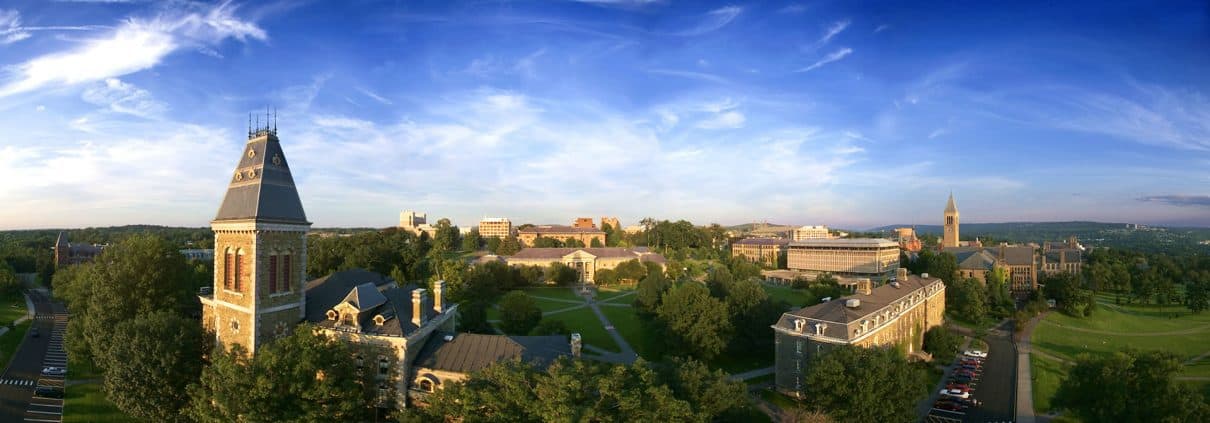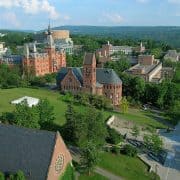Why I Chose a Masters in Real Estate over an MBA (Updated 2025)
Going back to graduate school is a huge commitment. First there’s the admissions process, which means spending hours and hours studying for the GMAT or GRE, filling out lengthy admissions applications, writing dozens of mindless essays, preparing for and doing informal and formal admissions interviews, and enduring the stress of not knowing if you’re in, or not. And once you do (hopefully) get accepted, it’s expensive! Not only do you spend $50k – $200k on tuition, books, and living expenses, but you also miss out on one to three years of income that you otherwise would have earned had you not chosen to go back to school.
Read our profiles detailing the top Masters in Real Estate programs, the top MBA in Real Estate programs, and the top Undergraduate Programs in Real Estate
To further add complexity to the decision, if you’re wanting to work in real estate (think real estate development, finance, private equity, asset management, CMBS origination, REIT management, etc), you have to decide whether to attend a Masters in Real Estate program or an MBA program. Now don’t get me wrong, the rewards of attending the right graduate program more than outweigh the costs, but this is a big decision that should not be taken lightly. So allow me to explain the key reasons why I chose a specialized master’s degree in real estate over a general MBA.
Update Note from Spencer: I originally wrote this post in 2015. Now, eight years later, I’m updating the post to keep it fresh and offer a few additional insights I’ve gathered since then. Also since that time, Michael shared his reasons why he chose both an MBA and a Masters in Real Estate. Be sure to read that to get a complete picture.
A Bit of Context
First to provide some context, I am a graduate of the Baker Program in Real Estate at Cornell University (Baker ’15). The Baker Program is a two-year program, structured much like an MBA program, but focused entirely on the study of real estate. It is unique among real estate master’s programs in that it requires two years of study rather than one, which allows students to complete a summer internship between their first and second year, and elect a concentration specific to their career interests. The Baker Program in Real Estate was the only non-MBA program I applied to. I was accepted to several top MBA in Real Estate programs, but ultimately chose the two-year master’s degree in real estate for the following reasons:
1. The People
“To get a step up in the world, you could use a ladder, or you could use your connections. I prefer the latter.” – Jarod Kintz
In the age of the internet and with the growing prevalence of natural language AI models such as ChatGPT, virtually everyone has free and open access to education on just about any subject imaginable. Attending a formal graduate program, therefore, is about much more than just the coursework. In large measure for me, and for most people who attend professional graduate programs, it’s about the people. In a world where “it’s not who you know, it’s who knows you”, graduate school is a great place to grow your network exponentially.
I chose a specialized real estate program, because I wanted to be around other real estate people. I wanted to interact and engage everyday with people who were equally as passionate about real estate as I am; people who would one day be the leaders of the industry and to whom I could turn for assistance as my own career progressed. In a typical elite MBA program, maybe 2-4% of the class is made up of students interested in real estate – and most of those are focused on the finance side of the business. In a real estate program, 100% are real estate students, with their interests spanning the industry spectrum from RE private equity to CMBS, from acquisitions to asset management. If you’re a real estate person, you’ll find that you’ll come away with a stronger, more focused network at a top masters in real estate program.
2. The Subject Matter
“Passion is energy. Feel the power that comes from focusing on what excites you.” – Oprah Winfrey
Graduate school is not undergraduate school. The idea is not to sacrifice two years of your life studying concepts you’re not that interested in learning. Graduate education, especially professional graduate education, is largely meant to advance your career. So why not take courses that align more with your career interests? As I weighed my graduate school options, I compared the course offerings of MBA programs, to those of masters in real estate programs. I saw that:
- I could take Management Communication (MBA), or Communications in Real Estate (MRE) – which would I enjoy more?
- I could take Supply Chain Management (MBA), or Real Estate Development Process I & II (MRE) – which would I enjoy more?
- I could take Corporate Finance (MBA), or Real Estate Finance and Investments (MRE) – which would I enjoy more?
- I could take Business Statistics (MBA), or Statistical Analysis of Real Estate Data (MRE) – which would I enjoy more?
As I went down the list, I realized that I didn’t want to be sitting in an MBA classroom, studying supply chain management with a room full of students intent on going to Johnson & Johnson, Amazon, or FedEx. I wanted be sitting in a room full of students passionate about the built environment, and the business of real estate development. I didn’t want to spend two years of my life studying marketing from the perspective of a retailer, I wanted to study marketing from the perspective of a real estate owner. It became very clear to me that I would be bored with an MBA curriculum, while the course offerings of the masters in real estate program got me excited.
3. The Career Opportunities
“The right man, in the right place, at the right time, can steal millions.” – Gregory Nunn
Every Thursday, a distinguished real estate industry leader came to campus to speak personally to the 50 graduate real estate students in our masters program. We had a real estate career advisor, whose sole job it was to connect real estate students with top real estate companies. Twice a year, we attended the Cornell Real Estate Council conference, where members of the 1500+ strong council meet to network, learn from industry titans, and have a little fun. Dozens of real estate companies every semester posted jobs to the program’s job board, specifically looking for real estate students, and several times a year our program organized a real estate career fair where 20 – 30 real estate companies interface with Cornell real estate students.
As I went through the job search process and met with prospective employers, they knew I was 100% committed to real estate because I chose to pursue a targeted real estate degree. The career resources for a real estate student at a masters in real estate program are more focused, and more personal than those of an MBA program. And in terms of compensation, the average salary for graduates of top masters in real estate programs is comparable with that of top MBA programs.
No Regrets
These are a few of the reasons I ultimately chose a masters degree in real estate over an MBA. I’ll be honest, I was hesitant at first to forego the MBA brand for the less well-known masters in real estate degree. However, I don’t regret the decision. The caliber of people I was able to engage with, the quality of the real estate education, and ultimately the many career opportunities that opened up to me validated my decision.
If you’re confronted with this same decision and would like to discuss the differences between the MRE and the MBA further, please don’t hesitate to contact me. Also, co-founder and co-contributor here at A.CRE, Michael Belasco, completed dual MBA and Master’s in Real Estate degrees at Cornell University. He provides a slightly different perspective and has shared his thoughts on that decision to complete both an MBA and Master’s in Real Estate.
Either way, best of luck to you as you make this important decision!
Frequently Asked Questions about Choosing a Masters in Real Estate over an MBA
Why did the author choose a Masters in Real Estate (MRE) over an MBA?
The author chose the MRE because it offered a more targeted experience, with 100% of students focused on real estate, allowing for stronger connections and more relevant coursework. “I wanted to be around other real estate people… people who would one day be the leaders of the industry.”
How did the subject matter influence the decision?
The author preferred real estate-focused courses over broader MBA topics. For example, rather than taking “Supply Chain Management (MBA),” the MRE offered “Real Estate Development Process I & II.” The author wrote, “It became very clear to me that I would be bored with an MBA curriculum.”
What were the career advantages of choosing a Masters in Real Estate?
The MRE program provided focused career resources: real estate-specific job boards, a dedicated career advisor, regular industry speakers, and exclusive events like the Cornell Real Estate Council conference. Employers also viewed the author as more committed to real estate due to his degree choice.
Is the compensation for MRE graduates comparable to MBA graduates?
Yes. According to the post, “the average salary for graduates of top masters in real estate programs is comparable with that of top MBA programs.”
Did the author have any initial concerns about choosing the MRE?
Yes. The author admits he “was hesitant at first to forego the MBA brand,” but ultimately had “no regrets” due to the program’s people, curriculum, and career outcomes.
What unique features does the Cornell Baker Program in Real Estate offer?
The Baker Program is two years long, allowing for a summer internship and a specialized concentration. Weekly speaker events, focused career support, and connections through the Cornell Real Estate Council also set it apart.
Can someone pursue both an MBA and a Masters in Real Estate?
Yes. Co-founder Michael Belasco pursued both degrees at Cornell. His perspective complements the author’s, offering insights into pursuing a dual-degree path for those wanting both general business and specialized real estate education.
How can someone get help deciding between an MRE and an MBA?
The author invites readers to reach out directly for a discussion. Additionally, the A.CRE site features profiles of top MRE and MBA real estate programs to aid in decision-making.









